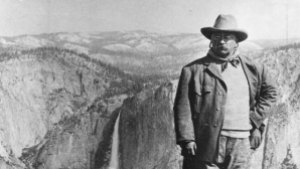
I recently finished the Pultizer Prize winning biography The Rise of Theodore Roosevelt by Edmund Morris. It is a fascinating telling of the years leading up to Roosevelt’s presidency. But one of the themes that marks his entire narrative that I find most compelling is his desire to encourage manliness in himself and in other men.
Anything manly is a major focus of mockery and disdain in American culture today. With Talladega Nights and other movies, Will Ferrell has made a career out of mocking what our culture thinks of as manliness. As funny as they are, Teddy Roosevelt would not be amused.
Not too long ago, one of those ridiculous lists named Bend the 7th most manly city in the United States. Nice. So, we’ve got that going for us.
According to the obvious in-depth research into both what it means to be “manly” and into every city in the union, our locale is 7th in manliness because of our love of beer and our love of outdoor activities.
Now, I love great beer and Bend brews some of the best in the nation. And I love the outdoors and competitiveness. Heck, I plowed my way through the 10.5 hilly miles and 19 military grade obstacles of Tough Mudder and loved the physical thrill of pushing myself through it — there was even a beer waiting at the end of it (though not a great one). According to the article’s criteria, I should qualify as a man’s man. I think Teddy would have given me a hearty slap on the back as well.
But is it really the ability to consume adult beverages and intense outdoor activities that makes a man a man? Not even close. As challenging as Tough Mudder was, there was nothing truly heroic about it. As much as I love the hoppy bitter of a rich IPA, it adds flavor to life but isn’t the meat of life itself. True manliness isn’t found in our ability to consume activities or beverages, but in a purposeful existence that extends far beyond my consumerist desires.
Roosevelt loved his adult beverages and rigorous engagement with the untamed natural world, but he continually pursued a more purposeful engagement. That’s what he sought when he led the charge up San Juan Hill in Cuba. That’s what he sought when he banged his head against the political machines of his time, both Republican and Democratic. That’s what he sought while promoting his conservative social ethics and progressive political initiatives.
In Ephesians 5:25-29, we are presented with a compelling image of manliness. It includes:
1. A real willingness to die for his wife. I don’t mean that passive dying as in “this marriage is killing me” kind of dying. I mean an active dying, which includes an ungrudging willingness to give up desires and comforts, in order to see his wife become more alive.
2. A real desire to see his wife shine and exude beauty. Manliness asks, “What will make my bride flourish?” And then it makes sure she does. Her success is his. Her beauty is his.
3. And a commitment to his wife that at least matches his love for himself. Most men are fully committed to their own pleasure, making sure they watch the sports they want to watch, drink the beer they want to drink, have as much sex as they can get, get the tattoos they want, and so on. In fact, the manliness of Bend is pretty much just guys doing what they want for themselves. But real manliness means being at least equally committed to loving your wife as to loving yourself.
Again, I think Teddy would agree.
During an era where manhood is under continual assault, Roosevelt would fight back. He’d drink his IPAs and engage in intense physical activity (he did install a boxing ring in the White House after all), but push us beyond our self-centered consumerist approaches to manhood.

